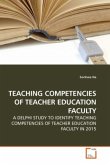For much of the 20th century, the majority of higher education faculty were hired on the tenure track, making them eligible to receive full rights and privileges associated with such achievement. However, since 2001, merely one quarter of new faculty appointments have been full-time, tenure-track positions. Actually, many colleges and universities are reluctant to offer tenured or tenure-track positions; instead, institutions offer nonrenewable yearly contracts or adjunct contracts without benefits, higher salaries, accelerated leave, or other financial considerations. This mixed-methods study analyzed and reflected upon the values that motivate faculty at four public universities in North Carolina to relinquish or decline tenure. Schwartz's value theory provided a theoretical framework for investigating this phenomenon beyond higher education's usual empirical studies of tenure based solely on teaching, research, and service. The results of this study will increase academia's understanding of what faculty value in their tenure roles, providing information useful in the development of policies and practices that protect the academic freedom of all scholars with or without tenure.
Bitte wählen Sie Ihr Anliegen aus.
Rechnungen
Retourenschein anfordern
Bestellstatus
Storno








